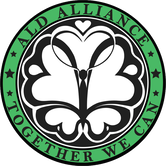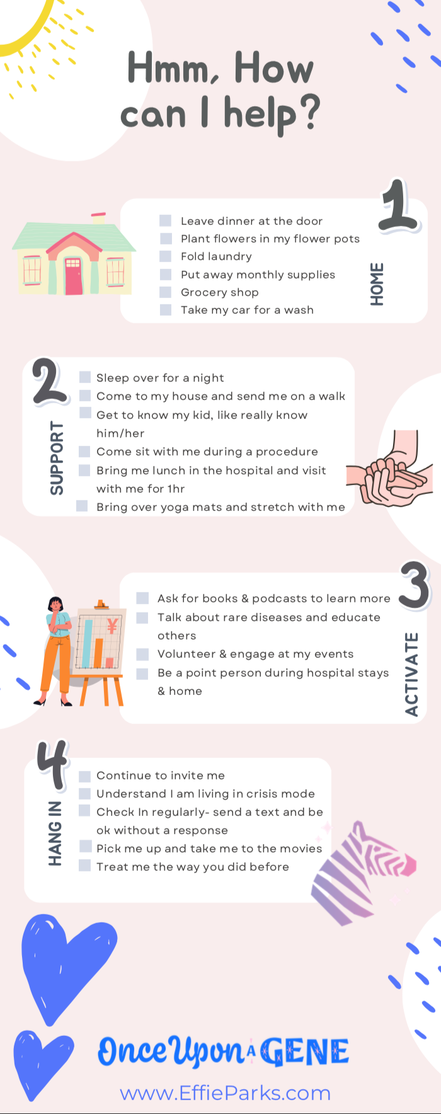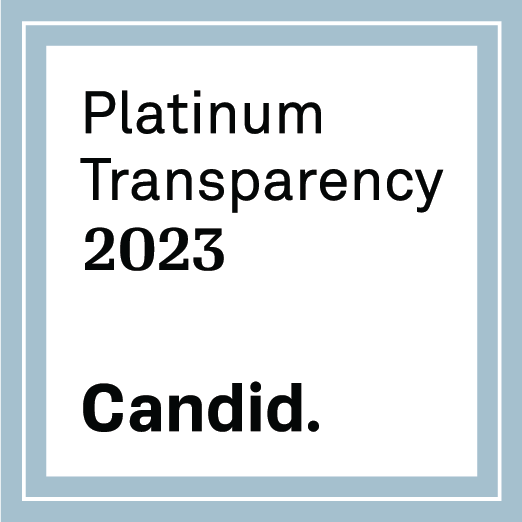|
Seeking support from your community
Staying connected with friends, family, and individuals in your community will continue to be important as your family adjusts to life after transplant. Knowing that there are people that you can count on if you need something small or large, or even just to chat, can be a huge source of relief. Sometimes, you may find it difficult to ask for help. We are here to remind you that everyone needs help at some time or another. Admitting that you need help and reaching out to others when needed is a huge sign of strength. It also models to your child or children that you cannot do everything or be everything all the time. When others offer to help, take them up on it. For these situations, it may be helpful to come up with a list of ways that your family can be supported. Even small tasks can feel like a huge burden when you’re juggling school drop offs and pick-ups, medical appointments, therapy appointments, and/or a full-time job. Think about what tasks are particularly draining for you, and see if there are any tasks that you can delegate to someone else. For example, you can ask someone to pick up your child from school or drop off a meal for dinner. Eventually, you may find that you’re in a good place to provide advice and help others navigate their ALD journey. If that is of interest to you, we encourage you to reach out to ALD organizations like ALD Alliance, ALD Connect, or Facebook groups to find ways to support other families going through similar experiences. Your knowledge, wisdom, and experience may be invaluable to another family who is new to the ALD community. |
We LOVE this graphic from Once Upon a GENE's Effie Parks. This is a great visual to share with family and friends that want to help but do not know where to begin. Here it is in PDF format for easy printing...and easy asking!
|
Connecting to support resources
There are a variety of external resources available to help children and families at different stages of their ALD journey. Remember that there are many ALD parents who have walked in your shoes. You may find it helpful to connect with other parents who have also already gone through the transplant process and know what new concerns or needs may arise for your child or family in the coming months and years. Organizations like ALD Alliance and ALD Connect are great resources for connecting with other families to hear about their experiences.
It is important to remember that you are not alone in this journey. There are many resources available to support you and your family before, during, and after treatment including emotional, financial, and educational resources. Support can look different for everyone. Some people lean on family and friends, others find comfort in talking to families who have gone through similar experiences or healthcare professionals who have experience working with families affected by ALD. As noted above, some turn to practices such as taking walks, exercising, meditating, practicing mindfulness, and/or participating in counseling or therapy. As you begin to think about various support options, consider which suit you and your family’s needs best as different support options work for different people. Try not to be discouraged if you try something and don’t end up liking it as there are many alternatives!
We would like to acknowledge that there will likely be some barriers to accessing support resources depending on your location, financial situation, time, and childcare availability. In response, we tried to provide a range of options to suit families' unique situations:
Social Interaction: groups, family, friends, etc.
If you find that connecting with other people is generally helpful for you, then family, friends, and ALD-related support groups may be great resources for you. If you decide to lean on family, friends, and/or support groups, it is important that you surround yourself with people who meet your individual needs. Meeting with other families affected by ALD is a great way to learn from and connect with people who share a similar life experience. Be mindful that members in these groups may be in different stages of their ALD journey than you, so you may hear about experiences beyond your family’s current stage or that your family may never experience. Similar to friends and family, it is important to make sure you “click” with fellow ALD families. Some support group networks include ALD Alliance, ALD Connect Community Calls, Be The Match, and Facebook groups (links below):
There are a variety of external resources available to help children and families at different stages of their ALD journey. Remember that there are many ALD parents who have walked in your shoes. You may find it helpful to connect with other parents who have also already gone through the transplant process and know what new concerns or needs may arise for your child or family in the coming months and years. Organizations like ALD Alliance and ALD Connect are great resources for connecting with other families to hear about their experiences.
It is important to remember that you are not alone in this journey. There are many resources available to support you and your family before, during, and after treatment including emotional, financial, and educational resources. Support can look different for everyone. Some people lean on family and friends, others find comfort in talking to families who have gone through similar experiences or healthcare professionals who have experience working with families affected by ALD. As noted above, some turn to practices such as taking walks, exercising, meditating, practicing mindfulness, and/or participating in counseling or therapy. As you begin to think about various support options, consider which suit you and your family’s needs best as different support options work for different people. Try not to be discouraged if you try something and don’t end up liking it as there are many alternatives!
We would like to acknowledge that there will likely be some barriers to accessing support resources depending on your location, financial situation, time, and childcare availability. In response, we tried to provide a range of options to suit families' unique situations:
Social Interaction: groups, family, friends, etc.
If you find that connecting with other people is generally helpful for you, then family, friends, and ALD-related support groups may be great resources for you. If you decide to lean on family, friends, and/or support groups, it is important that you surround yourself with people who meet your individual needs. Meeting with other families affected by ALD is a great way to learn from and connect with people who share a similar life experience. Be mindful that members in these groups may be in different stages of their ALD journey than you, so you may hear about experiences beyond your family’s current stage or that your family may never experience. Similar to friends and family, it is important to make sure you “click” with fellow ALD families. Some support group networks include ALD Alliance, ALD Connect Community Calls, Be The Match, and Facebook groups (links below):
- ALD Alliance
- Contact Miranda ([email protected] / 917-860-3756) or Elisa ([email protected] / 917-750-9390)
- ALD Connect Community Calls
- ALD Connect coordinates periodic telephone conference calls to provide peer support. Whether it’s men with AMN, women with AMN, or newborn screening parents, ALD Connect community calls offer support and deepen connections with each other.
- Be The Match BMT Survivorship Chats
- Facebook: ALD Support Group (1.4 k members)
- This group is available to families who are affected by ALD/AMN. The group comes together to give support, compassion and strength to each other, and deal with the different stages of ALD. This is a closed group so an administrator will have to approve your membership once a request to join has been made.
- Facebook: ALD Family Support Group (557 members)
- This group is available to support parents and direct family members dealing with ALD from pre-diagnosis (waiting for VLCFA confirmation), throughout transplant, post-transplant, and those who have lost their ALD warriors but would like to continue fight this battle and help others.
- Family Voices
- You and your family may benefit from participating in the local chapter of the Family Voices program in your state, which is a free state-wide parent-to-parent support program for families with children with special health care needs. You may be interested in receiving support from families with children who have similar needs and experiences, or you may consider being advocates to other families with children who have similar medical needs as your child.


